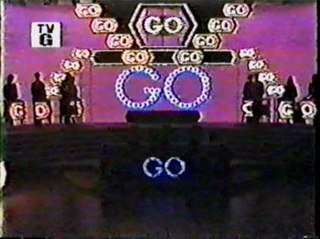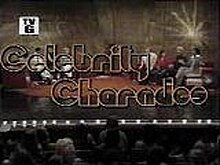
Charades is a parlor or party word guessing game. Originally, the game was a dramatic form of literary charades: a single person would act out each syllable of a word or phrase in order, followed by the whole phrase together, while the rest of the group guessed. A variant was to have teams who acted scenes out together while the others guessed. Today, it is common to require the actors to mime their hints without using any spoken words, which requires some conventional gestures. Puns and visual puns were and remain common.

Match Game is an American television panel game show that premiered on NBC in 1962 and has been revived several times over the course of the last six decades. The game features contestants trying to match answers given by celebrity panelists to fill-in-the-blank questions. Beginning with the CBS run of the 1970s, the questions are often formed as humorous double entendres.

Pyramid is an American game show franchise that has aired several versions domestically and internationally. The show was developed by Bob Stewart. The original series, The $10,000 Pyramid, debuted on CBS on March 26, 1973, and spawned seven subsequent Pyramid series. Most later series featured a full title format matching the original series, with the title reflecting an increasing top prize. Two teams, each consisting of a celebrity and contestant, attempt to convey mystery words and phrases within a common category, against a time limit, to win cash and prizes. The title refers to the show's pyramid-shaped gameboard, featuring six categories arranged in a triangular fashion. The various Pyramid series have won a total of nine Daytime Emmys for Outstanding Game Show, second only to Jeopardy!, which has won 13.

The Newlywed Game is an American television game show. Newly married couples compete against each other in a series of revealing question rounds to determine how well the spouses know or do not know each other. The program, originally created by Robert "Nick" Nicholson and E. Roger Muir and produced by Chuck Barris, has appeared in many different versions since its 1966 debut. The show became famous for some of the arguments that couples had over incorrect answers in the form of mistaken predictions, and it even led to some divorces.

Password is an American television game show. Two teams, each composed of a celebrity and contestant, attempt to convey mystery words to each other using only single-word clues, in order to win cash prizes.

Lingo is an American television game show with multiple international adaptations. Contestants compete to decode five-letter words given the first letter, similarly to Jotto. In most versions of the show, successfully guessing a word also allows contestants to draw numbers to fill in a Bingo card.

I've Got a Secret is an American panel game show produced by Mark Goodson and Bill Todman for CBS television. Created by comedy writers Allan Sherman and Howard Merrill, it was a derivative of Goodson–Todman's own panel show, What's My Line?. Instead of celebrity panelists trying to determine a contestant's occupation, however, as in What's My Line, the panel tried to determine a contestant's secret: something that is unusual, amazing, embarrassing, or humorous about that person.

Chain Reaction is an American television game show created by Bob Stewart, in which players compete to form chains composed of two-word phrases.

Jackpot is an American and Canadian television game show produced by Bob Stewart which saw contestants attempting to solve riddles in order to win cash and prizes.

Go is an American television game show created by Bob Stewart and aired on NBC from October 3, 1983, to January 20, 1984. The show featured two teams, each composed of four contestants and a celebrity. The teams had to construct questions one word at a time to convey a word or phrase to their teammates. The concept of Go was based on "Instant Reaction", an endgame played on two different iterations of another game show created by Bob Stewart, Chain Reaction, in 1980 on NBC and from 2006–07 on GSN.

Body Language is an American game show produced by Mark Goodson Productions. The show aired on CBS from June 4, 1984, until January 3, 1986, and was hosted by Tom Kennedy. Johnny Olson announced until his death in October 1985; Gene Wood and Bob Hilton shared the announcing duties afterward, having substituted on occasion before then.

Mindreaders is an American game show produced by Goodson-Todman Productions that aired on NBC from August 13, 1979, through January 11, 1980. Although NBC originally agreed to a 26-week run, the network canceled Mindreaders after 22 weeks. The host was Dick Martin and the announcer was Johnny Olson, with Jack Narz subbing. The program was taped at Studio 4 at NBC in Burbank, California.

Pantomime Quiz, initially titled Pantomime Quiz Time and later Stump the Stars, was an American television game show produced and hosted by Mike Stokey. Running from 1947–59, it was one of the few television series – along with The Arthur Murray Party; Down You Go; The Ernie Kovacs Show, The Original Amateur Hour; and Tom Corbett, Space Cadet – to air on all four TV networks in the US during the Golden Age of Television.
PDQ and Baffle are American television game shows created by Heatter-Quigley Productions. Both shows' objective was for contestant/celebrity teams to guess a given word or phrase in the shortest amount of time with the fewest letters given as possible.

The Face Is Familiar is an American game show which aired in color on CBS as a summer replacement show from May 7 to September 3, 1966. The show was hosted by Jack Whitaker and featured celebrity guests including Bob Crane, Dick Van Patten, Mel Brooks and June Lockhart.
Pyramid is an Australian children's quiz show screening on the Nine Network from 2009 to 2015 hosted by Shura Taft. It is co-produced by Sony Pictures Television and produced by Sydney-based Ambience Entertainment. It began broadcasting on 1 September 2009 and is filmed in front of a live studio audience. It involves two teams competing in games of "vocal charades". The show is based on the 1979 United States game show The Junior Partner Pyramid, a children's variant of the Sony Pictures Television Pyramid franchise.
The Celebrity Game is an Australian game show that aired in two different formats. The original series, based on an American game show of the same name, was hosted by Bert Newton on the Nine Network in 1969 as Australia's Celebrity Game. The later series, based on the game of charades, involving two teams of celebrities, was hosted by Mike Preston on Network Ten ran from 1976 to 1977.
Hollywood Game Night is an American television game show that aired on NBC from July 11, 2013, to July 5, 2020. The series, which is hosted by Jane Lynch, follows two contestants who take part in a casual game night with three celebrities each, making the main episode a game between two four-player teams. Five games are played on each episode, with teams accumulating points based on their performance in each of the games. After the fifth game, the contestant on the team with the most points competes in a bonus round with one of the episode's celebrities. The chosen celebrity plays for a chance to win $10,000 for a charity of his or her choice, while the contestants compete to win $25,000.
The Chase is an American television quiz show adapted from the British program of the same name. It premiered on August 6, 2013, on the Game Show Network (GSN). It was hosted by Brooke Burns and featured Mark Labbett as the "chaser". A revival of the show premiered on January 7, 2021, on ABC. It is hosted by Sara Haines and initially featured as the chasers Jeopardy! champions James Holzhauer, Ken Jennings, and Brad Rutter. Labbett returned as a chaser in June 2021, before stepping down in 2022 along with Jennings. In their place are Buzzy Cohen, Brandon Blackwell, and Victoria Groce.
Idiotest is an American television game show broadcast by Game Show Network (GSN). Hosted by Ben Gleib, the series features contestants in teams of two competing to answer brain teaser and puzzle questions. The winning team advances to a bonus round for an opportunity to increase their winnings to $10,000. The series was announced at GSN's upfront presentation in March 2014, and the first episode premiered on August 12, 2014 of that year. On December 15, 2018, the first season became available to watch on Netflix.














